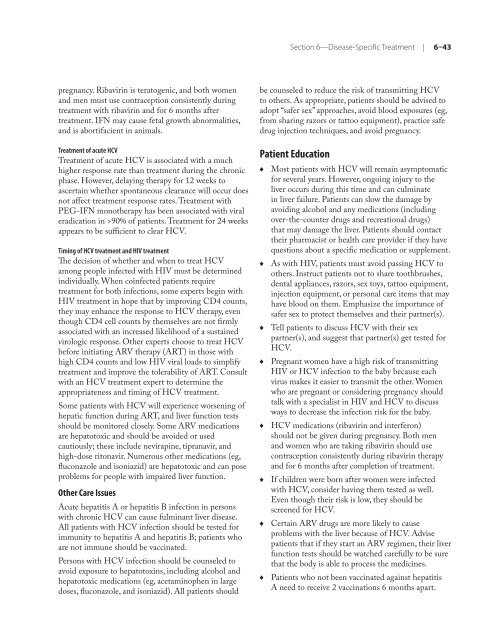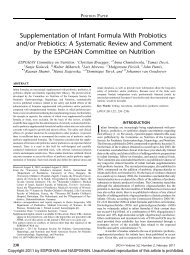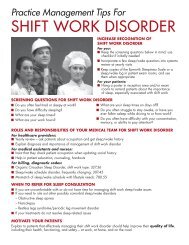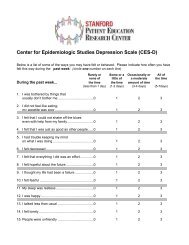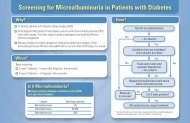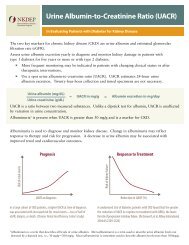Clinical Manual for Management of the HIV-Infected ... - myCME.com
Clinical Manual for Management of the HIV-Infected ... - myCME.com
Clinical Manual for Management of the HIV-Infected ... - myCME.com
Create successful ePaper yourself
Turn your PDF publications into a flip-book with our unique Google optimized e-Paper software.
pregnancy. Ribavirin is teratogenic, and both women<br />
and men must use contraception consistently during<br />
treatment with ribavirin and <strong>for</strong> 6 months after<br />
treatment. IFN may cause fetal growth abnormalities,<br />
and is abortifacient in animals.<br />
Treatment <strong>of</strong> acute HCV<br />
Treatment <strong>of</strong> acute HCV is associated with a much<br />
higher response rate than treatment during <strong>the</strong> chronic<br />
phase. However, delaying <strong>the</strong>rapy <strong>for</strong> 12 weeks to<br />
ascertain whe<strong>the</strong>r spontaneous clearance will occur does<br />
not affect treatment response rates. Treatment with<br />
PEG-IFN mono<strong>the</strong>rapy has been associated with viral<br />
eradication in >90% <strong>of</strong> patients. Treatment <strong>for</strong> 24 weeks<br />
appears to be sufficient to clear HCV.<br />
Timing <strong>of</strong> HCV treatment and <strong>HIV</strong> treatment<br />
The decision <strong>of</strong> whe<strong>the</strong>r and when to treat HCV<br />
among people infected with <strong>HIV</strong> must be determined<br />
individually. When coinfected patients require<br />
treatment <strong>for</strong> both infections, some experts begin with<br />
<strong>HIV</strong> treatment in hope that by improving CD4 counts,<br />
<strong>the</strong>y may enhance <strong>the</strong> response to HCV <strong>the</strong>rapy, even<br />
though CD4 cell counts by <strong>the</strong>mselves are not firmly<br />
associated with an increased likelihood <strong>of</strong> a sustained<br />
virologic response. O<strong>the</strong>r experts choose to treat HCV<br />
be<strong>for</strong>e initiating ARV <strong>the</strong>rapy (ART) in those with<br />
high CD4 counts and low <strong>HIV</strong> viral loads to simplify<br />
treatment and improve <strong>the</strong> tolerability <strong>of</strong> ART. Consult<br />
with an HCV treatment expert to determine <strong>the</strong><br />
appropriateness and timing <strong>of</strong> HCV treatment.<br />
Some patients with HCV will experience worsening <strong>of</strong><br />
hepatic function during ART, and liver function tests<br />
should be monitored closely. Some ARV medications<br />
are hepatotoxic and should be avoided or used<br />
cautiously; <strong>the</strong>se include nevirapine, tipranavir, and<br />
high-dose ritonavir. Numerous o<strong>the</strong>r medications (eg,<br />
fluconazole and isoniazid) are hepatotoxic and can pose<br />
problems <strong>for</strong> people with impaired liver function.<br />
O<strong>the</strong>r Care Issues<br />
Acute hepatitis A or hepatitis B infection in persons<br />
with chronic HCV can cause fulminant liver disease.<br />
All patients with HCV infection should be tested <strong>for</strong><br />
immunity to hepatitis A and hepatitis B; patients who<br />
are not immune should be vaccinated.<br />
Persons with HCV infection should be counseled to<br />
avoid exposure to hepatotoxins, including alcohol and<br />
hepatotoxic medications (eg, acetaminophen in large<br />
doses, fluconazole, and isoniazid). All patients should<br />
Section 6—Disease-Specific Treatment | 6–43<br />
be counseled to reduce <strong>the</strong> risk <strong>of</strong> transmitting HCV<br />
to o<strong>the</strong>rs. As appropriate, patients should be advised to<br />
adopt “safer sex” approaches, avoid blood exposures (eg,<br />
from sharing razors or tattoo equipment), practice safe<br />
drug injection techniques, and avoid pregnancy.<br />
Patient Education<br />
♦<br />
♦<br />
♦<br />
♦<br />
♦<br />
♦<br />
♦<br />
♦<br />
Most patients with HCV will remain asymptomatic<br />
<strong>for</strong> several years. However, ongoing injury to <strong>the</strong><br />
liver occurs during this time and can culminate<br />
in liver failure. Patients can slow <strong>the</strong> damage by<br />
avoiding alcohol and any medications (including<br />
over-<strong>the</strong>-counter drugs and recreational drugs)<br />
that may damage <strong>the</strong> liver. Patients should contact<br />
<strong>the</strong>ir pharmacist or health care provider if <strong>the</strong>y have<br />
questions about a specific medication or supplement.<br />
As with <strong>HIV</strong>, patients must avoid passing HCV to<br />
o<strong>the</strong>rs. Instruct patients not to share toothbrushes,<br />
dental appliances, razors, sex toys, tattoo equipment,<br />
injection equipment, or personal care items that may<br />
have blood on <strong>the</strong>m. Emphasize <strong>the</strong> importance <strong>of</strong><br />
safer sex to protect <strong>the</strong>mselves and <strong>the</strong>ir partner(s).<br />
Tell patients to discuss HCV with <strong>the</strong>ir sex<br />
partner(s), and suggest that partner(s) get tested <strong>for</strong><br />
HCV.<br />
Pregnant women have a high risk <strong>of</strong> transmitting<br />
<strong>HIV</strong> or HCV infection to <strong>the</strong> baby because each<br />
virus makes it easier to transmit <strong>the</strong> o<strong>the</strong>r. Women<br />
who are pregnant or considering pregnancy should<br />
talk with a specialist in <strong>HIV</strong> and HCV to discuss<br />
ways to decrease <strong>the</strong> infection risk <strong>for</strong> <strong>the</strong> baby.<br />
HCV medications (ribavirin and interferon)<br />
should not be given during pregnancy. Both men<br />
and women who are taking ribavirin should use<br />
contraception consistently during ribavirin <strong>the</strong>rapy<br />
and <strong>for</strong> 6 months after <strong>com</strong>pletion <strong>of</strong> treatment.<br />
If children were born after women were infected<br />
with HCV, consider having <strong>the</strong>m tested as well.<br />
Even though <strong>the</strong>ir risk is low, <strong>the</strong>y should be<br />
screened <strong>for</strong> HCV.<br />
Certain ARV drugs are more likely to cause<br />
problems with <strong>the</strong> liver because <strong>of</strong> HCV. Advise<br />
patients that if <strong>the</strong>y start an ARV regimen, <strong>the</strong>ir liver<br />
function tests should be watched carefully to be sure<br />
that <strong>the</strong> body is able to process <strong>the</strong> medicines.<br />
Patients who not been vaccinated against hepatitis<br />
A need to receive 2 vaccinations 6 months apart.


